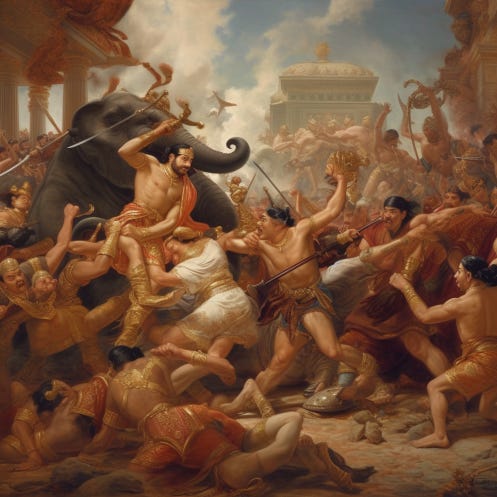Hello readers,
Another month, another round-up. Today we’re going to check out some cool learnings from last month across brand building, history, investing…and AI, of course. No discussion in the world right now is complete if it doesn’t contain those two letters in that exact sequence.
Here we go:
Dominos vs Pizza Hut: Winner Brands’ newsletter has been consistently publishing interesting stories of brands that have managed to build memorable identities. One case study I particularly enjoyed was on the approach of the 2 big pizza giants when they entered the Indian market- and how their radically different decisions took them on very different paths. At a time when the Indian market wasn’t even fully familiar with the idea of eating pizzas, Domino’s took a major bet on the fact that people would embrace the idea of ordering pizzas at home. It was a really bold bet. Pizza Hut decided to build out its restaurant experience instead- exemplified by the bell happy customers would ring. But Domino’s stuck to its guns. Using its masterful “30 minutes or free” idea and consistent brand storytelling, was able to emerge as the clear winner in the Indian ecosystem.
Passive investing: The one question that haunts every professional is: “Where the hell should I invest my money?”. The markets are full of hucksters making people buy new products every day, pitching them as the road to retirement, only to come back and hawk some new shit. It’s like fooling a 2-year-old, the only difference being that one day the kid will figure out he was being fooled. In the process, people trade their way to serfdom while the huckster can comfortably retire on the back of their masterful misselling. So what is one supposed to do? If at all there’s a good 2-word answer to this question, it is Index Funds. Just mirror the markets and go to sleep on your cheap sofa. Index funds simply invest in indices like NIFTY 50 or S&P 500, and take away the burden of stock picking, timing the markets, trusting a fund manager, spending time on (mis)managing your portfolio, and trying to predict where the markets will go every picosecond. It allows you to sit back and say “I don’t know, and I don’t care”. There can’t be a more enviable position to be in.
AI, the new McKinsey: Ted Chiang, in this brilliant piece, argues that a great metaphor to understand where the capitalist machine might take AI is to think of it as becoming the new McKinsey. Why do most Fortune 100 firms hire them? To do their dirty work while the firms themselves can conveniently shed all accountability. For instance, McK has helped various giants accomplish the ultimate objectives of boosting the bottom line through questionable practices- like initiating mass layoffs and triggering the Opioid crisis. AI might don a similar hat and help meet the management’s objectives by replacing workers and contributing to shareholder value. An important question to think of is- how can we design AI systems to serve the goals of workers instead and prevent a corporate takeover that further tips the scales against the masses and worsens the inequality nightmare.
Reevaluating India’s history: A common question that many people seem to have is “What’s the innate fault in our civilization that we’ve been attacked and conquered for so many centuries?”. As J Sai Deepak argues, the question itself is historically incorrect and does painful disservice to the centuries of heroic resistance that people all over the country have offered to invaders. It wholly ignores the multi-millenium continuity of the Bhartiya civilization in the face of one onslaught after another, while so many of the pre-Chirstian and pre-Islamic civilizations have been totally lost in the quicksands of history. In fact, one has to wonder “How is it that we’ve been around for thousands of years while so many civilisations have either perished or are failing to resurrect their ancient traditions today?”. It’s because the Bhartiya people fought spiritually, militarily, culturally and politically. The original question doesn’t emerge from a place of knowledge and historical perspective but from a place of profound darkness- and we ought to read much more about Indian history so we can disabuse ourselves of the notion that Bharat is a weak, defeated civilization.
A Profound Technological Breakthrough: One of my fortuitous discoveries in May has to be this 18-episode series which traces the ascent of man, the tech themes and lessons of history to ultimately answer the question “What is money?”. You may not realise it at first, but this question can take you down an endless rabbithole and reveal deeper truths as your progress. That’s what Michael Saylor does in this college-course like series, explaining the profound implications of a technology like Bitcoin. Money is the highest form of energy, and for the first time in human history, we’ve figured out a way to store energy in a leak-proof manner. It’s the most efficient way to transfer value across space and time- a feat that no tech has allowed humans to achieve till date. Very few can recognise the profound implications, and what this means for humanity.
That’s it for now, homies. Hope you have a great Sunday and keep learning.
If you want to read more of these mind-opening pieces, here are some popular ones:





Great collection, as usual!
For Dominos, the '30-minute delivery or free' experiment turned out to be revolutionary.
Loved the analogy between AI and McKinsey – and it makes sense :D
Very interesting collection of essays. When Domino's entered the market in India, food delivery at home was unheard of, they literally paved the way for Zomato to pick up on the idea a few years later. And this is a perfect example of how a brand and clever marketing can go hand in hand, Paresh Rawal Domino's ads are iconic.